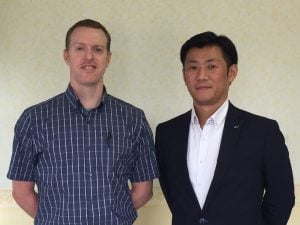
Bradley Corbet is a Senior Consultant at Morgan McKinley, a professional recruitment and talent management company operating in Japan, the United Kingdom, Ireland, EMEA, and throughout the Asia Pacific region.
Interview subject: Bradley Corbet, Senior Consultant, HR Team, Morgan McKinley, Tokyo
Citizenship: United States
Years in Japan: 25
Q: How has the recruiting business changed recently?
A: The number of recruiters has consistently risen over the last 10 years. This is because Japan’s economy is doing well, and because of technology and new product development. The Lehman Shock of 2008-9 shook up the industry, especially those focused on finance, but it has since recovered, and is thriving again.
Q: How does the overall job market look now?
A: The labour market is tight. There are more jobs and workers. This is true not only at the executive level but across the board. It’s a very candidate driven market.
Q: What kinds of attributes are you looking for in people who may be interested in being a recruiter?
A: Some type of background in sales or some skills that are transferable to recruiting are welcome. We also look for energy, enthusiasm, and confidence, but without cockiness.
Q: How about education?
A: It’s useful to have knowledge of the industries in which you are engaged, but not critical. At the core of it, however, recruiting is sales. If you have any experience in selling anything, then you have the basic skills it takes.
You have to understand that everything is negotiable, and have to want to close deals. If you have had a taste of sales, and you enjoy that, then this might be a career for you.
Q: What separates one recruiter from another?
A: Recruiting is about relationships. By the time I call a prospective candidate, I’m probably the sixth or seventh person to do so. So why would they want to talk to me?
You have to have empathy with the person on the other side of the phone; give them a reason to continue to talk to you for more than a few minutes. We are grooming people to build relationships and be consultants, not just recruiters and headhunters. It’s a fine art.
Q: Please describe a typical daily routine for those wanting to be a recruiter.
A: New people spend a lot of time using the database, matching candidates to a job specs, generating lists of people to call. There is a lot of cold calling, then emails and follow-ups, The Goal at Stage 1 is to get a meeting with the candidate.
Most firms do not dictate what time you go home. It can be 6 o’clock, 7 o’clock, or 8 o’clock, depending on the workload and the schedule. You manage your own schedule. But there are key performance indicators (KPI), and these are composed of calls and candidate meetings, everything is tracked.
Q: How long does one get to prove themselves?
A: Expect a grace period of three to six months for inexperienced people to study the market and prove that they can do the job. Some agencies are sink-or-swim, but whatever agency you select, keep in mind that revenue targets need to be achieved.
Q: Any tips for the potential interviewee?
A: I ask interviewees: ‘why do you want to do this – essentially earn a teacher’s salary plus the possibility of a commission?’ It’s hard work. I need to see the individual come out in the interview; if not, then I can recommend another line of work.
Q: How about general advice for would-be recruiters working in Japan?
A: Learn the Japanese customs before you learn the language. This is not just how to exchange business cards, but the general business mentality, common courtesies, etc. Language skills are not a primacy.
Q: Is hunting for professional talent really that different in Japan vs. other countries? If so, how?
A: There are a lot of differences, some subtle, some large. For example, lifetime employment no longer exists in Japan, but Japanese employees are still very loyal, and a lot of them will not want to work for a competitor. Things like that must be understood.
The local workforce is more liquid now, but the loyalty mentality still persists. Conversely, companies also need to understand that strategies are necessary in order to keep people from leaving. In general, Japanese employees may want to stay at their employer for at least five years, versus maybe two or three years for a foreigner. In Singapore and Hong Kong, tenures can be much shorter.



















